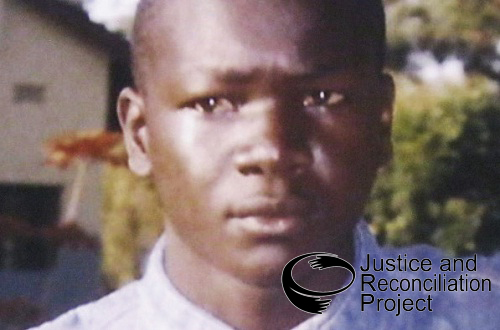Finding the Truth for Families of Persons Still Missing as a Result of Conflict in Northern Uganda By Sylvia Opinia One evening while finalising the preparations for the Dialogue on Disappearances Neville Wachibra, who went missing in 2002, poses in an undated photo. Family photo. to commemorate the International Day Against Enforced Disappearances on 30th … Continue reading The Right to Truth and Justice →
Let’s talk, Uganda (2016-2017) Long-term Effects of Wartime Sexual Violence on Women and Families: The Case of Northern Uganda (2015-2018) Across Ethnic Boundaries: Promoting regional reconciliation in Acholi and Lango sub-regions (2015) Everyday Peace Indicators (EPI) (2013-2016) The Right to Know (2012-2015) Transitional Justice Quiz competition for secondary schools (2012-2013) Voices (2012-2016) Bearing Witness: Dealing with the past to … Continue reading Past Initiatives →
As northern Uganda transitions amidst post-war recovery and reconciliation efforts, the issue of enforced disappearances and missing victims of mass atrocities during the war stands as a key obstacle in the process of healing, social repair, and advancement of transitional justice in the region. Working in collaboration with families of the missing, JRP has been … Continue reading Holding Community Dialogues with Families of Missing Persons →
LIRA – Two days before the United Nations designated International Day of the Disappeared, families from across northern Uganda will come together on Friday, 28 August 2015, in Lira town to remember their missing loved ones. The day-long event is part of a ‘sub-regional dialogue’ on missing persons as a result of conflict in northern … Continue reading Families join hands to commemorate the International Day of the Disappeared in Lira →
If you are in the Kitgum area please tune into Mighty Fire 91.5 FM between 6 and 7 pm today (26 August 2015) where JRP’s Grace Acan will be speaking about The Right to Know campaign on missing persons.
By Nancy Apiyo Continuing from last issues ‘Ododo Wa: Our Stories’ (‘Storytelling, Gender and Reparations’ Voices, Issue 2, September 2012), JRP’s Gender Justice department uses the mechanism of story telling to ascertain the views of war affected women on the Right to Know, truth-telling processes, missing persons and the need for reconciliation at community level. … Continue reading A Truth-Telling Process that will lead to reconciliation →
What the ‘Right to Know’ means for victims in Northern Uganda By Lino Owor Ogora Despite experiencing close to four years of relative peace, Northern Uganda continues to grapple with several recovery challenges. Among these challenges are answered questions regarding the plight of people who continue to be missing. Many of these people were either … Continue reading Providing Answers for Families →
By Sylvia Opinia To commemorate the internationally recognised day against enforced disappearances, the Justice and Reconciliation Project in collaboration with Children/Youth as Peace Builders (CAP) Uganda organised a dialogue on the 30th of August 2012 between stakeholders, victims groups and civil society organisations in Northern Uganda to generate debate on addressing the issue of people … Continue reading The Dialogue on Disappearances →
By Simon Robins The conflicts over the last three decades in Northern Uganda have left many impacts, some better understood than others. The large-scale LRA abductions that have come to characterise the war in the Acholiland and beyond have produced a multi-faceted response targeting returnees, their families and communities. Returnees have benefitted from counselling … Continue reading Missing Persons: Towards A Victim Centred Approach →
Dear Readers, Welcome to our latest edition of Voices Magazine where we bring you some local perspectives on the ‘Right to Know’. In August JRP launched the ‘Right to Know’ campaign to draw attention to the significance of truth seeking and missing persons in the transitional justice discourse in Uganda. Key to this campaign is … Continue reading Letter from the PC →

